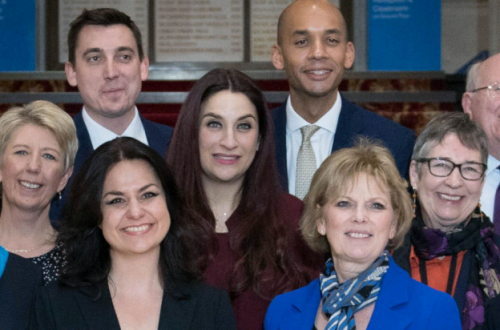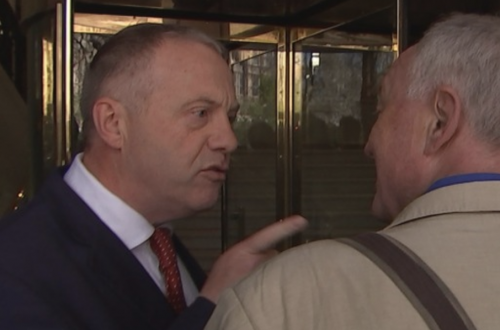This is a guest post by Mehrdad Amanpour
Some years ago, a friend sent me a shocking article. It said hundreds of British girls were being systematically gang-raped by Muslim gangs. It claimed this was being covered-up.
I’ve never had time for conspiracy theories, especially when they look as hateful as those in the article. So I checked the links and sources in the piece. I found an American racist-far-right website and from there, saw the original source was a similarly unpleasant website in the UK.
I did a brief search for corroboration from reputable mainstream sources. I found none. So I wrote a curt reply to my friend: “I’d appreciate it if you didn’t send me made-up crap from neo-Nazi websites”.
Some months later, I read the seminal exposé of the (mainly) ethnic-Pakistani grooming gang phenomenon by Andrew Norfolk in The Sunday Times.
I was stunned and horrified – not just that these vile crimes were indeed happening and endemic, but that they really were being ignored and “covered-up” by public authorities and the mainstream media.
Every population has its conspiracy nuts – those who ignore reputable media sources. People who’d rather scour the internet for any narrative that fits their own preconceptions, with little regard for the credibility of the ‘news’ sources they read.
In the high-trust, advanced societies of the West, where freedom of speech is still taken for granted, conspiracy-nuts tend to form a small minority. However, this isn’t the case in low-trust and less socially advanced societies and particularly, in oppressive, illiberal states.
My father-in-law lived under communism. He tells me how mainstream news was regarded by almost everyone as a joke. In bars and workplaces, a report of a “record harvest” was met with derision and comments like “It’s time for ‘record’ temporary shortages again” or “So, we’re buying ‘record’grain from the US this year.”
It’s lazy to think that the media and government officials in Communist societies reported false truths and censored true ones purely out of malign authoritarianism. They did so out of a misplaced belief that truth is not always conducive to the greater good. And of course, they did so out of fear of being accused of being something nasty – a “counter-revolutionary” for example. Sufficient to destroy a reputation or career. Sometimes worse than that.
That’s pretty much what happened with the grooming gangs scandal – public officials and the mainstream media saw a situation that was so counter to right-thinking ‘truth’, they turned and ran, refusing to acknowledge it. Revealing such truth to the general public would surely be risky – it might mean saying something that might also have been said by someone on the racist-far-right – “and we we don’t want to be associated with that”. And in our free and democratic societies we don’t have counter-revolutionaries. But the epithet of “racist” can and does still destroy reputations and end careers, particularly in the public sector.
Not only that, but some on the left in the West see certain ideas and even some easily verifiable truths, as plain dangerous, much like the totalitarian communists of yesteryear. Dangerous to public order. Dangerous to the ‘common good’.
Whilst this section of the left has always existed, it now seems to have become more ‘mainstream’. It seethes and obsesses within carefully-policed ideological echo-chambers. It dominates in universities, trade unions and the public sector. And whereas it was once mainly prevalent in fringe far-left outfits, it has now effectively co-opted the Labour party through its membership and leadership.
Anyone who has ever tried to engage with this section of the left will know that it doesn’t ‘do debate’ with conservatives on issues like immigration, multiculturalism and identity politics. For it, “the debate is settled”. Opposing views are intrinsically wicked. Such ideas are to be ignored. Muted. Blocked. Banned. Disrupted. Drowned out with fog-horns.
It does not feel it needs to win the argument nor does it see any reason to engage in one. Where it can apply ‘No Platform’ or ‘Safe Space’ schemes to stymie debate, it will do so assiduously. Where it can’t, it’s adept at innovating campaigns such as #StopFundingHate to help promote the censorship it craves.
Whilst the overall number of individuals espousing this groundless sense of moral certainty is relatively small, its effect on political discourse has been disproportionately large given that its champions are focused, organised and operate in the relatively influential sectors mentioned above.
As a result, much of the mainstream media and even world leaders have either adopted its illiberal approach and anti-intellectual language or else avoided language that might provoke its ire.
Today, we’re seeing Western governments implement increasingly restrictive ‘hate-speech’ laws to suppress ideas and comments considered dangerous to the common good. Merkel is leading the charge, seeking to block what she considers to be ‘hate speech’ from social media in Germany.
What is she thinking? If the police-state of the communist DDR where she grew up was unable to stop ‘subversive’ ideas, what on earth makes her think she can achieved it in the interconnected free world of the 21st century? All she’ll achieve will be to vindicate and intensify the ‘undesirable’ message.
We see Barack Obama addressing his people, eyes-wide and straight faced, telling them that Islamic State and Islamist terrorism has nothing whatsoever to do with Islam. Indeed, he suggests, it has less to do with Islam than any other religion.
Around the same time, Trump, members of his team and the alt-right media are suggesting to the American people that all Muslims are suspect and that Islam is an intrinsically violent ‘political ideology’.
Whilst both statements are depressingly facile and untrue, there is no doubt that, especially given his status as US President, Obama’s well-intentioned and utterly misguided bit of politically-correct nonsense provided much undeserved cogency to the alt-right’s gratuitous essentialism.
And which side ultimately won that argument as far as the American people are concerned?
The same can be said for the arguments around immigration in the Brexit debate. Every time I heard “Immigration benefits us all” – that oft-repeated mantra from the Remain camp, I despaired. Clearly Remain, stuffed as it was with the “debate is settled” brigade had no clue on how the right was winning this argument and no experience on how to counter it.
Of course, most of the immigration we receive has an economic benefit for most of us. But some of that immigration is indubitably an economic and social burden to all of us and some of us experience more disadvantage than ‘benefit’ from immigration generally.
So all the right had to do was to demonstrate that the politically-correct ‘truth’: “Immigration benefits us all” is factually incorrect to win the argument. In fact, it didn’t need even need to prove it. The statement is so manifestly untrue, it only served to add credibility to Leave’s argument on this issue.
The same applies to the Migrant Crisis – who can forget how European leaders, the BBC and the left-wing press referred (and in some cases still refer) to the migrants as “Syrian Refugees, fleeing war”, sometimes adding a photograph of a woman and child.
All the right had to do here was to provide evidence (of which there is plenty from reputable sources) that most of the migrants were neither Syrian, nor women and children nor were most “fleeing” countries that were at war. With that, the establishment version of ‘truth’ was discredited and the right’s argument was won without the actual complexities of the issue even needing to be addressed.
Throughout the West, we see politically inconvenient truths partially censored or unreported. Or else they’re rephrased and altered in order to appear virtuous.
Post truth – Framing ‘truth’ in emotional, ‘ideologically-virtuous’ terms rather than the complex and sometimes unwelcome reality real truth takes.
Didn’t the left invent it? Hasn’t it done this for decades?
No, the alt-right didn’t invent post truth. But it’s certainly learned how to take advantage of the left’s abuse and overuse of it.
What should worry us all today is that the public response to mainstream truth in the West increasingly reflects the stories I hear from my father-in-law. Politically-correct terms used by the left are increasingly co-opted into conversations and social media to mean something else entirely. You can now find examples in mainstream newspapers, the alt-right media and even within the below-the-line comments of the Guardian.
‘Cultural enrichment’ is now a sardonic and common term for crime by immigrants. ‘Vibrant community’ means a violent area with a high immigrant population. ‘Religion of peace’ means violent Islamism. ‘Youths’ means young Muslim criminals. ‘Refugees’ means illegal immigrants. ‘Children’ means bearded young men. ‘Syrian’ means a migrant not from Syria. ‘Doctors and engineers’ means semi-literate and unskilled migrants.
It’s so disheartening. Those who use it will say it’s ironic humour. The joke’s certainly on the left. This, I assume, is an example of the ‘hate’ that sections of the left are seeking to stop. Business as usual – censor those who poke fun at your virtuous version of ‘truth’.
Brexit. Trump. Le Penn. Wilders. The alt-right. Throughout the Western world, the populist right is on the rise.
Yet sections of the left still won’t engage it nor even bother itself with trying to win the debate. It simply plods on refusing to acknowledge uncomfortable truths. It doesn’t practice and hone its arguments nor learn to persuade those who are being sold simplistic and brutal solutions to addressing those truths. So high-minded. So contemptuous.
The alt-right on the other hand has done nothing else but try to persuade. It’s strategy has been to monopolise the often small and politically-inconvenient truths avoided by much of the left. Wearing those truths like the cloak of a prophet it has won credibility and trust with a large and increasing section of the public. And with that credibility, it is now in a position to make simplistic and probably dangerous ‘solutions’ become our reality.
It may not be pleasant or kind when the Daily Mail or Sun show pictures of grown men being admitted to the UK as ‘child refugees’. But what’s the alternative? Should such information be kept from the public? Won’t doing so give a monopoly on that truth to the extremists? Doesn’t a monopoly on inconvenient truths by extremists empower them more? Haven’t we learned anything from the grooming scandal?
I’ll finish with a note to the left, some of whom I believe are most to blame for Brext, Trump and the rise of the alt-right:
A PR guru once told me that the best way to handle potentially detrimental information is to get your retaliation in first. Report the bad news yourself and come out ready to face your publics. Do it with truth and decorum – bovine rebuttal and personally attacking your opponents might look good to those within your organisation, but to the public they make you look like a loser.
Do that and you’ll have some control over the narrative. You keep some credibility. The worst thing possible is to refuse to discuss the issue, try to deny, cover up or sugar-coat it. The truth will out and your opponents will achieve credibility for exposing it. They will control the narrative. They will be able to embellish and twist it to suit their own purposes.
And finally, to the many reasonable and genuinely liberal people who still exist on the left – our democracies need you. That’s from a Conservative. We need the balance you bring to political discourse. It may serve our establishment to co-opt some of your number as useful idiots in order to bolster their increasingly illiberal agenda when it comes to controlling speech, but don’t fall for it. Free speech is the way we’ll prevent our societies from swinging too far to the right. Engage. Debate. Try to win the argument.
No one’s suggesting it’s easy to engage with people whose views you dislike, especially over issues that you’d rather were different in reality. But ask yourselves this:
“How’s our current strategy been working out for us?”


